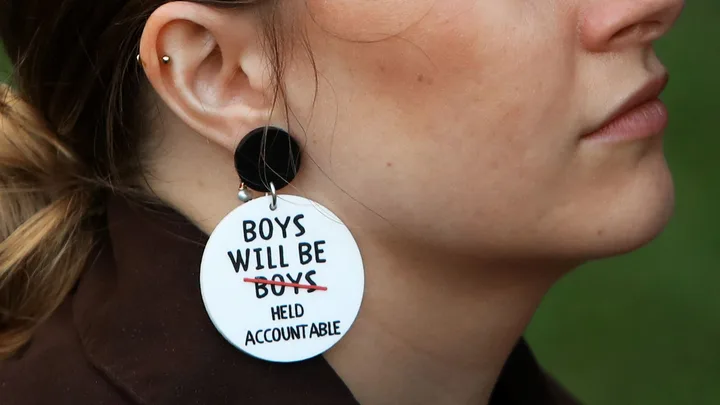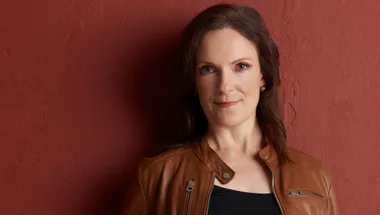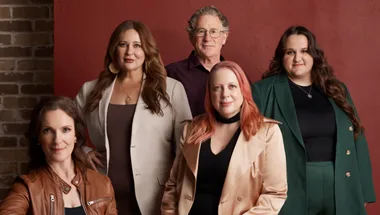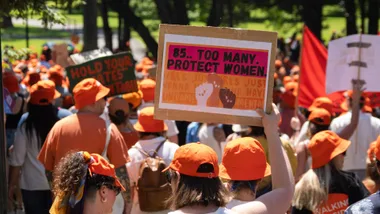On November 25, the International Day for the Elimination of Violence Against Women marked the beginning of 16 Days of Activism Against Gender-Based Violence, both in Australia, and around the world.
Those 16 Days of Activism may have ended, its conclusion signals yet another stark realisation. Between November 25 and December 10 journalist Sherele Moody, founder of Australian Femicide Watch and The Red Heart Campaign, has reported the deaths of eight women.
According to Femicide Watch, that number takes the toll of women killed this year to 97.
Now, more than ever, it’s time for men to stand up and actively work with women, with other men, and themselves, to stop gender based violence before it begins.
What Can Men Do To Stop Violence Against Women?
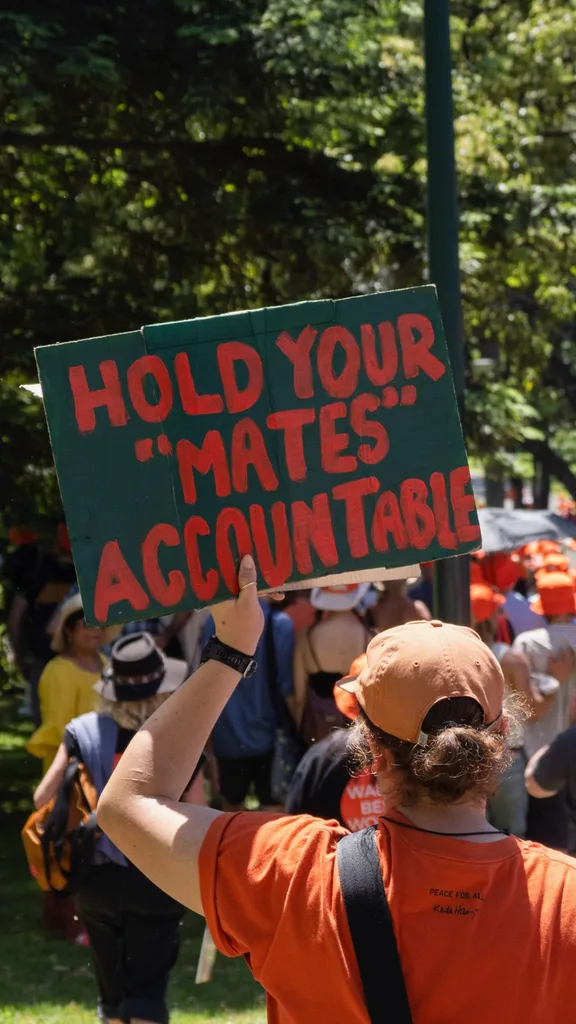
From actively shutting down toxic conversations about women, and calling our harmful male stereotypes, to amplifying and supporting women’s voices in the workplace, there’s something that every man can do to bring about real and solution-based change.
“Men have a crucial role to play by stepping up, challenging harmful norms, and actively supporting efforts to eliminate violence,” says Rachel Bishop from National Rally Collective.
“These actions not only support the campaign but also contribute to lasting cultural and societal change.”
Data shows that the approach to galvanising men and encouraging involvement and understanding lies in destigmatisation and removal of pressures associated with preconceptions of masculinity. That’s not to say it’s that simple, because it’s categorically not. But stopping violence at the start begins with addressing and identifying behavioural conditioning before it has the chance to mutate into something more.
According to Our Watch data
- 4 in 5 men surveyed want to change the alarming rates of violence against women, although 43% say they personally can’t do anything to change this
- 45% of men feel pressure to be ‘manly’
- 24% of men feel that pressure most at work
In her book Fixed It, writer Jane Gilmour explores how our attitudes are shaped by the “preconceptions and subconscious biases we’ve learned through millions of tiny interactions with the world … in every advertisement, movie, song, poem, photo, joke, headline, book, comic strip, news article comedy sketch or TV show.”
Essentially, behaviours are rarely innate – they are learnt.
“We know that young men receive an overwhelming amount of ‘advice’ about how to be a man today, including on social media and in popular culture, such as pornography,” says Our Watch CEO Patty Kinnersly, whose organisation is a national leader in the primary prevention of violence against women and their children.
“To stop violence before it starts, we must work with young men and boys at school, in workplaces and online to help them navigate the complexities of what healthy masculinities look like for them.
“If we do this right, it is more likely that young men will grow up to be respectful, feel safe to express their emotions and know that violence is never the answer.”
As well as walking alongside women to call out bad behaviour, lending support and believing survivors is the only way to move forward.
Ending domestic violence requires understanding why it happens in the first place.
Research conducted by groups such as Australia’s National Research Organisation for Women’s Safety (ANROWS) tells us that men who use violence most likely experienced violence as children. “We need to be able to recognise that in the solutions – while also holding men to account for their current behaviour,” says Dr Tessa Boyd-Caine, CEO of ANROWS, which conducts evidence-based research into domestic, family and sexual violence.
It’s Time To Talk
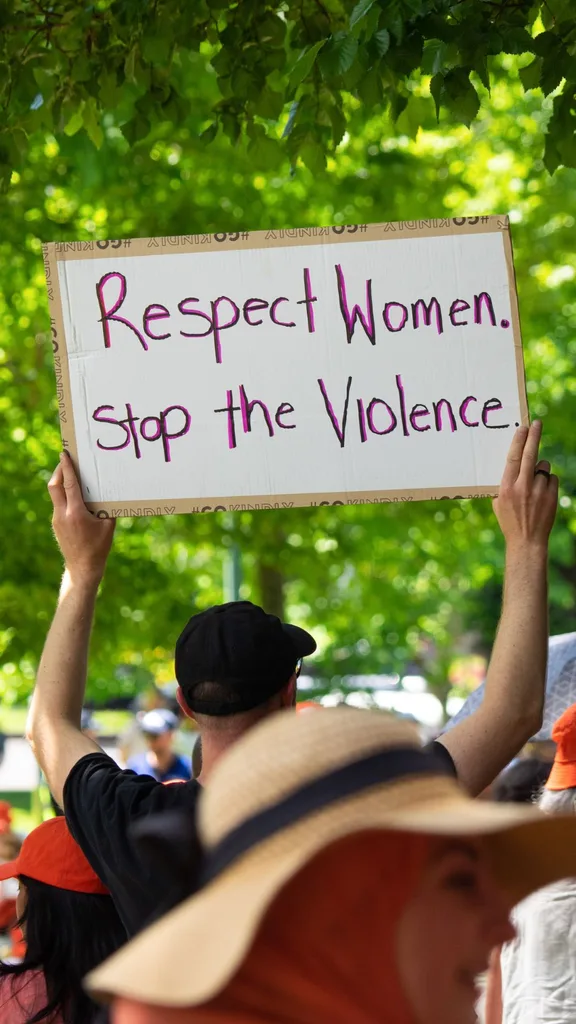
This year, there has been a notable groundswell of support around initiatives, organisations and education programs that centre men’s role in preventing, and stopping, violence against women.
While this is a hugely positive step in the right direction, it will take a multi-pronged approach to enact real momentum.
“During this time, and beyond, it is essential to highlight the need for conversations among men to change, encouraging them to take responsibility for challenging toxic masculinity, addressing harmful behaviours, and fostering a culture of accountability and respect,” says Bishop.
“To effectively cut gender-based violence, both grassroots and government actions must work in tandem. At the grassroots level, we need community-led education programs that teach respect, consent, and healthy relationships, as well as bystander intervention training to empower individuals to challenge harmful behaviours.”
It’s also important to note understand that having these conversations can and will be uncomfortable, but encouraging men to sit with that discomfort – however hard it may be – is the real driver here. It’s these conversations that can help break down assumptions that influence disrespectful behaviour, and while we don’t need them to be perfect (and they won’t be), we do need them to be happening.
How Men Can Get Involved
- Challenge disrespect: Speak up and call out disrespectful and derogatory behaviour even if it makes you feel uncomfortable. You can do this by walking away, changing the topic, or directly addressing the behaviour itself.
- Listen to women: Show your support by actively listening and working to understand the experiences of women and victim-survivors.
- Advocate: Attend rallies, join events and be an active participant in the fight against violence.
- Encourage healthy conversations: This applies to everywhere from the workplace to the sports field.
- Educate: Be a good role model for your sons, mates and men in your life to help dismantle male stereotypes.
What To Watch, Read & Listen To
Education doesn’t just start and end in the classroom. With the current state of algorithmic affairs fostering dangerous webs of social media misinformation, misogyny and hate speech, it’s more important than ever to seek out content that promotes the opposite. May we suggest some of the below?
Read
- Good Material by Dolly Alderton
- Boys Will Be Boys by Clementine Ford
- She Is Not Your Rehab by Matt Brown with Sarah Brown
- Consent Laid Bare by Chanel Contos
Watch
- Asking For It
- Australian Story: Out of the Chaois – Anna Coutts-Trotter
- You Can’t Ask That: Series 4 Domestic and Family Violence
Listen
1800RESPECT is the national domestic, family, and sexual violence counselling, information and support service. If you or someone you know is experiencing, or at risk of experiencing, domestic, family or sexual violence, call 1800RESPECT on 1800 737 732, chat online via www.1800RESPECT.org.au, or text 0458 737 732. Men’s Referral Service: 1300 766 491.
Family And Domestic Violence Support Services
- 1800 Respect national helpline: 1800 737 732
- Women’s Crisis Line: 1800 811 811
- Men’s Referral Service: 1300 766 491
- Relationships Australia: 1300 364 277
- Lifeline (24 hour crisis line): 131 114
- NSW Domestic Violence Line: 1800 656 463
- Qld DV Connect Womensline: 1800 811 811
- Vic Safe Steps crisis response line: 1800 015 188
- ACT 24/7 Crisis Line: (02) 6280 0900
- Tas Family Violence Counselling and Support Service: 1800 608 122
- SA Domestic Violence Crisis Line: 1800 800 098
- WA Women’s Domestic Violence 24h Helpline: 1800 007 339
- NT Domestic violence helpline: 1800 737 732
Related articles:
- Honouring The Women Who Have Lost Their Lives To Violence This Year
- It Ends With Us: The Changemakers Demanding We All Do Better
- Dr Tessa Boyd-Caine On Australia’s Domestic Violence Attitude Gap
